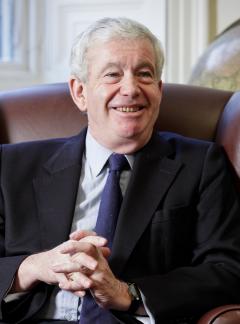Principal's Foreword
Introduction to the Annual Review 2015/16 by the University's Principal, Professor Sir Timothy O'Shea.

Reflecting on our success
The University’s Annual Review always provides a welcome opportunity to reflect on the successes and achievements we have been fortunate enough to enjoy over a 12-month period.
This edition, my final one as Principal and Vice-Chancellor, is no exception and its content illustrates the breadth and quality of our institutional activity across the course of a year.
As well as allowing time for reflection, it provides our many partners and supporters with a fascinating snapshot of a year in the life of a great University.
In this regard it is our most important publication.
It is designed, presented and written in such a way as to appeal to as wide a range of readers as possible, and as a result, it is something which I have always been exceptionally pleased and proud to send out to our diverse audiences.
This year’s Review begins with an in-depth look at our leading-edge research in the field of robotics, an area in which I have a personal interest, having worked in artificial intelligence at Edinburgh myself in the 1970s.
Those were the days of Freddy the Robot which seem far removed from the present-day Valkyrie we now have at Edinburgh, one of the most advanced humanoid robots in the world.
Giving back to communities
Along with our staff, our students are one of our greatest assets and I take great pleasure from the numerous examples I see of them giving back to the communities in which they live and study.
Here we focus on Environmental Science undergraduates who have been working to bring solar power to refugees in Greece and we also look at the voluntary work our students have been doing as part of the Best Buddies scheme, assisting adults with learning difficulties in Edinburgh.
The University has long held an excellent reputation in the field of nursing and this year we mark that with a look back at 60 years of Nursing Studies at Edinburgh, making it Europe’s oldest nursing department.
The pioneering research that we undertake really does have the ability to change people’s lives for the better, in many cases at a global level.
In this edition of the Annual Review we examine the strides that are being taken in the fight against Parkinson’s disease by colleagues working in the field of regenerative medicine; we look at the inspiring contribution we have made to child protection in Peru; we shine a light on the ground-breaking work we are carrying out to help tackle the rise of antimicrobial resistance and we feature the launch of our new Global Academy of Agriculture and Food Security.
Ensuring everyone has year-round access to a safe, nutritious and affordable diet is a major global challenge in an age of climate change.
We have always done our utmost to create an environment which nurtures a spirit of entrepreneurship, for staff and students alike.
A recent success story in this regard has been the start-up company “Two Big Ears”, formed by two of our graduates and acquired by the social media giant Facebook in 2016.
Here they tell us how they develop audio technology which “helps you see through your ears”… The two-person team behind the company studied at Edinburgh College of Art, which became part of our University in 2011.
A growing university
That merger reminded me how much the institution has grown and evolved during my time here since 2002.
That expansion has strengthened us as a result, not just from a financial perspective but from a reputational one.
Back in 2002 we had a total of almost 33,000 undergraduate applications.
Now the figure stands at more than 62,000, having almost doubled in a period of some 15 years.
Our total student body stood at around 22,000 then and is now at more than 37,000, with a substantial growth in international students.
During the same period our total research funding has more than doubled from some £115 million in 2002 to almost £268 million now, based on the latest figures available.
I am not saying that bigger always means better – but I firmly believe that in Edinburgh’s case this growth has allowed us to exert our influence, assert our expertise and realise our ambitions in a much wider array of fields over the past 15 years.
It is a success story which is a testimony to the vision and aspirations of the whole University community – staff, students, alumni, supporters and friends – and leaves the University very well placed for the future and the challenges ahead.

